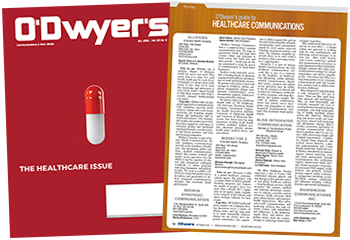 Thomas Graham |
As a healthcare entrepreneur, odds are your formidable expertise doesn’t extend into public relations. While patient-care practitioners are typically excellent communicators, those in other fields may not have as many opportunities to use and polish their communications techniques outside of industry or technical conferences.
But even excellent communicators need to know when and what to communicate to whom, how (what medium), why and where. This strategic process requires more groundwork than you may expect. That’s where a PR agency comes in.
Why PR? And why now?
Public relations practitioners are adept at assessing strengths and weaknesses, including personnel assets. Navigating your company to this point required you to apply your engineering or science brilliance to entrepreneurial ingenuity. You likely hired business and financial advisors, and perhaps sales and marketing professionals, to advise you on concept feasibility and investment potential.
Many of the brilliant technical minds behind today’s most promising startups lack one key factor that can greatly impact the success of their new company: the ability to communicate to non-technical people. Yet, that ability is a must-have skill, and one that is not so easily developed.
You understand the intricate detail of how a device works and fully comprehend the most complex algorithms and chemical formulas, but can you explain them in laymen’s terms?
Artful communications tells the story of how your company will change lives. This artistry is critical to building brand awareness, establishing your sales funnel, obtaining funding to take you to your next threshold and preparing for crises.
Here are just a few ways an experienced agency can help you.
Know when to seek attention, and from whom. We get it. You’ve put in the sweat for a few years, at great personal (and maybe financial) expense. You have a product — maybe one that’s past the beta stage. Early adopters or other first-phase indications are promising. You’re ready to tout the promises of your future success to the world!
Not so fast. Press coverage isn’t always a good idea, especially for a young organization — and especially in our digital news world. A solid, experienced agency will steer you toward the right channel at the right time. Perhaps industry analyst meetings or desk-side editorial introductions are the proper first move. Just like your business plan needed to be grounded in a solid foundation, so must your communications strategy.
Attract new investment. Most healthcare businesses are capital-intense, and time-to-market or commercialization may be years away. Despite your success in attracting early funding rounds, additional investment can be challenging. Detailing your story to an investment banker with limited exposure to medical technology and terminology is different than to a venture capitalist who specializes in your field — and the banker is not looking for a share in your company. It’s not enough to know your product; you must sell your vision and your team, clearly articulating both the value proposition of your product and the ability of your team in a well-organized and concise way that piques their interest enough to get to the due diligence stage.
Ideally, you will find an agency with both healthcare and banking/financial experience.
Build your brand. Building a brand is more than the perfect logo. It begins with your value proposition and is built from the inside out. Your internal culture must match the external persona the public sees. Successful brand building can take years, but starting out right is an important critical step. Don’t just look for agencies with flashy design teams; look for one with experience in employee communications, community relations, team-building experience and certifications such as Bleiker Consent Building.
Crisis preparation. Let’s start with one undeniable tenet: you will have a crisis. How you handle it can be a starting point for how you’re remembered for years to come — everything you’ve done right prior to that crisis won’t matter if you bungle your response.
We have a saying: the public will forgive a mistake, but they won’t forgive a leader who doesn’t own it by acknowledging, apologizing and improving. It’s not enough to have a plan; you have to account for every possible thing that can go wrong, and then practice it. We’ve seen companies emerge from a crisis even stronger than before.
Additional tips
Find an agency that understands your space. Hiring a PR professional solely based on her client headlines is useless if she doesn’t understand the challenges of healthcare tech, such as whether your targets are in rural areas with limited broadband access, or personal device data regulations.
Insist on startup experience. Startups lack history, and this can leave agencies floundering: How can they evaluate your past PR performance when you’ve been in stealth mode for two years? The experienced PR professional will seize the opportunity to “start from scratch,” working alongside you as an extension of your business and operations team (an alignment that should occur across public relations strategies for organizations of all sizes).
Don’t fight the focus. Startup executives are consummate multitaskers, but you also know distractions can veer you away from the big picture. Now you’re about to have one more competing element: your PR agency. Trust that your PR counsel will not ask you to divert your attention from your other critical tasks if it wasn’t important; you hired them to do a job and there are some facets of that work, especially when starting a new program, that require your focused attention to get the ball rolling.
Don’t diminish PR’s role. Public relations is a business function. Effective PR agencies take the time to read your business and marketing plans to ensure they align your communications goals with your business operations. (Hint: ask them what their first step is during your initial interview). Not only does this prevent your sales and PR teams from working against each other, but it also ingrains a culture early on that PR is essential in business. While that’s true for any company, it’s particularly true in healthcare.
If you’re new to the PR world, remember that communication is a two-way street: you and the media need each other. This give-and-take mindset requires building a relationship, and the best relationships are developed over time. Being an active participant in the foundation that your agency is building for you will give you greater trust in that foundation and the patience to wait for the results for your combined efforts.
***
Thomas Graham is Founder, President and CEO of Crosswind Media & Public Relations, which is celebrating its 10th anniversary.



 Lo Isidro, senior director at Real Chemistry with more than a decade of strategic communications and PA experience, has joined Narrative Strategies.
Lo Isidro, senior director at Real Chemistry with more than a decade of strategic communications and PA experience, has joined Narrative Strategies. Nelson Fernandez, former North American chair of APCO Worldwide and managing director of Burson-Marsteller, has joined Volunteers in Medicine Berkshires as director of communications and PA.
Nelson Fernandez, former North American chair of APCO Worldwide and managing director of Burson-Marsteller, has joined Volunteers in Medicine Berkshires as director of communications and PA. Lilit Bargar, who was most recently an EVP in the healthcare practice at Weber Shandwick, comes on board at GCI Health as EVP, corporate practice lead.
Lilit Bargar, who was most recently an EVP in the healthcare practice at Weber Shandwick, comes on board at GCI Health as EVP, corporate practice lead.
 Five ways that successful thought leaders are made.
Five ways that successful thought leaders are made.


 Have a comment? Send it to
Have a comment? Send it to 
No comments have been submitted for this story yet.